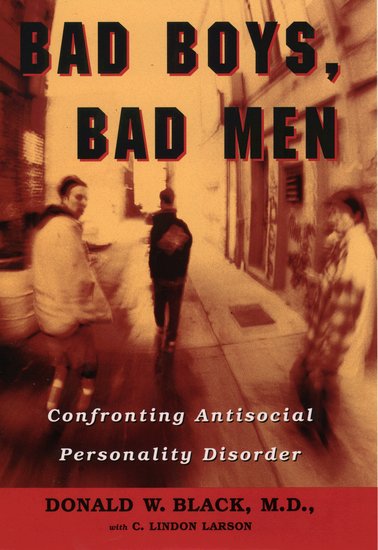By Donald W. Black, M.D.
Today is the 15th anniversary of one of the oddest episodes in the annals of sports — Mike Tyson bit the ear of Evander Holyfield in the third round of a heavyweight rematch, which led to his being disqualified from the match.
I profiled Tyson in Bad Boys, Bad Men: Confronting Antisocial Personality Disorder in 1999, and pointed out that Tyson had long been known for temper outbursts and violent behavior outside the ring. Aggression is often a sign of the psychiatric disorder “antisocial personality disorder” or ASP (and as I have not examined him cannot know if he has the disorder or not). Some violent persons channel their anger and violent tendencies in directions that earn approval or success, and in Tyson’s case, this seemed true. His combative talents that would lead to fame and (fleeting) wealth as a boxer were nurtured on the streets of Brooklyn, NY where he grew up, having been apprehended several times before age 12 for mugging and robbery. Yet, the unpredictable and harmful side of his aggression continued. His former wife Robyn Givens complained that he was violent and hot tempered during an interview with media star Barbara Walters. In 1992 he was convicted of raping an 18-year-old beauty pageant contestant and spent three years behind bars. He returned to boxing after his 1995 release, but was suspended from the sport after the ear-biting incident.

While updating Bad Boys, Bad Men, I took another look at Tyson, to see what had happened since the ear-biting incident. As one could predict, violence continued to dog him. In 1999, Tyson attempted to break both arms of boxer François Botha and he returned to prison later that year for having assaulted two motorists following a traffic accident the prior year. He retired from boxing in 2005, but continues to have highly publicized problems that include marital infidelity, illegal drug use, and traffic violations. He recently told talk show host Ellen DeGeneres that he has improved his life by becoming sober and adopting a vegan diet. Let’s hope that Tyson has learned important life lessons and is on the path to bettering himself.
Donald W. Black, M.D., is a Professor of Psychiatry at the University of Iowa Roy J. and Lucille A. Carver College of Medicine in Iowa City, Iowa. He has recently rewritten and retitled his book on ASP, which will be out later this year as Bad Boys, Bad Men: Confronting Antisocial Personality Disorder (Sociopathy), Revised and Updated. A graduate of Stanford University and the University of Utah School of Medicine, he has received numerous awards for teaching, research, and patient care, and is listed in “Best Doctors in America.” He also serves as a consultant to the Iowa Department of Corrections. His research has focused on impulsive and self-destructive behaviors. He writes extensively for professional audiences, and his work has been featured on 20/20, Dateline, and 48 Hours.
Subscribe to the OUPblog via email or RSS.
Subscribe to only sports articles on the OUPblog via email or RSS.
View more about this book on the ![]()
![]()




Recent Comments
There are currently no comments.